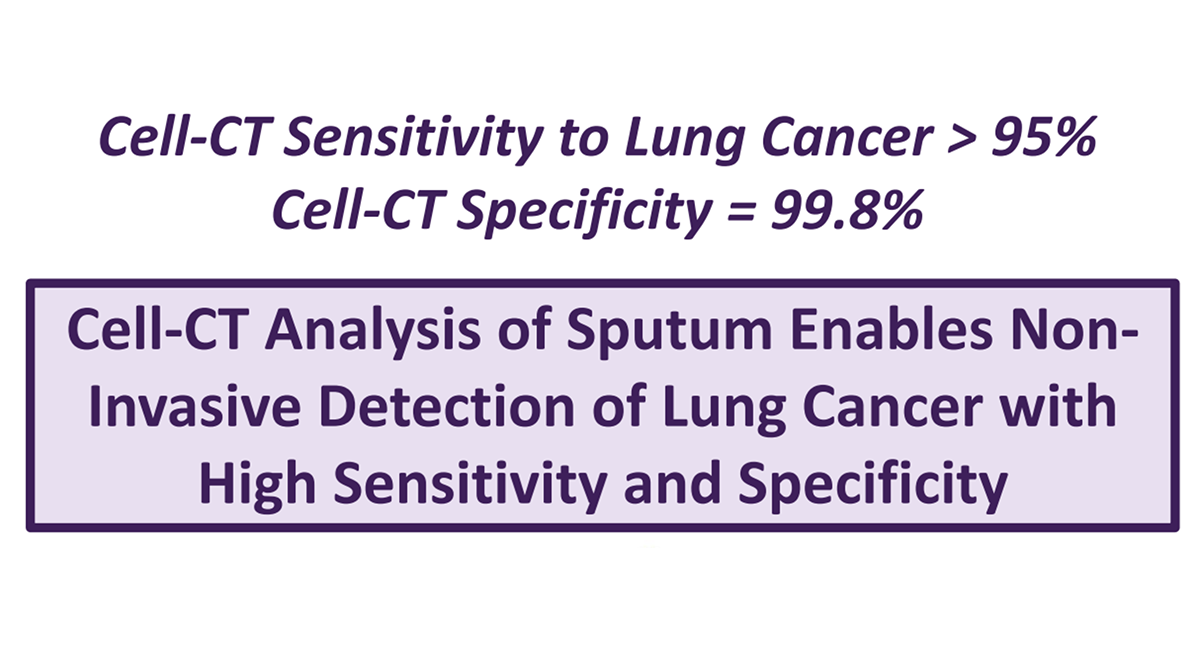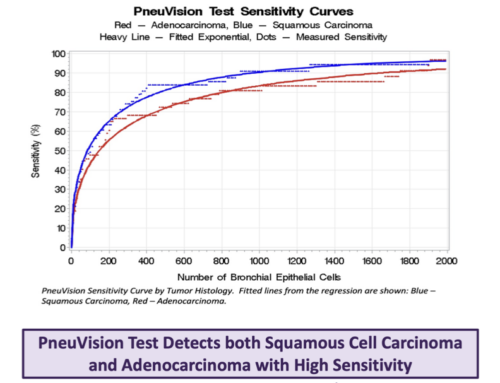VisionGate presents at the 2013 World Conference on Lung Cancer in Sydney

Pilot Study Results Demonstrate the Feasibility of Using Sputum Samples and the Cell-CT Platform to Non-Invasively Detect the Presence or Absence of Lung Cancer
Initially Focusing on Adjunctive Use with X-ray CT Lung Cancer Screening to Address the High Rate of False Positive Results
Sydney, Australia and Phoenix, AZ, USA – October 28, 2013 – VisionGate, Inc., a company developing a revolutionary non-invasive test for the early detection of lung cancer, today reported clinical data showing that its automated 3D cell imaging platform, the Cell-CT™, can detect lung cancer in sputum samples with high sensitivity and specificity. The data was presented at the International Association for the Study of Lung Cancer (IASLC) 15th World Conference on Lung Cancer.
The pilot study analyzed sputum samples from patients with confirmed lung cancer and from healthy individuals. The results show that VisionGate’s Cell-CT platform and LuCED® sputum test accurately detected the presence or absence of lung cancer cells in patient sputum from a spontaneous cough. In the 53 individuals studied to date, LuCED and the Cell-CT achieved a sensitivity of more than 95% and specificity of 99.8%. The high sensitivity indicates that the Cell-CT detects most cancers, and the high specificity means that the rate of false positive readings is exceedingly low. This is far greater accuracy than has been demonstrated with any other lung cancer screening test.
“Lung cancer remains the leading cause of cancer death in the U.S., primarily because it is not detected until after the cancer has spread,” commented Alan Nelson, Ph.D., Founder and CEO of VisionGate. “Results to date from this ongoing clinical study suggest that LuCED and the Cell-CT correctly identify more than nine out of every ten cases of lung cancer with virtually no false positive results, supporting the goal of developing a new lung cancer screening paradigm that is both accurate and cost-effective.”
The automated Cell-CT platform creates strikingly clear and comprehensive 3D digital images of the cells contained in sputum. It uses advanced algorithms to identify the presence or absence of cell biosignatures associated with malignant or normal status, making it possible to determine with great accuracy whether or not an individual has cancer.
Low-dose x-ray computed tomography (CT) screening can detect lung cancer at early stages and save lives. But x-ray CT screening has a very high rate of false positive results, which can require costly and invasive follow-up procedures. The large National Cancer Institute (NCI) National Lung Screening Trial showed that more than 96% of the “positive” results from x-ray CT screening were actually false positives. As a result, its use is recommended only in the highest-risk individuals. The potential ability of VisionGate’s Cell-CT platform to non-invasively and cost-effectively confirm or refute positive results from x-ray CT scans would make widespread use of lung cancer screening far more feasible.
Glen J. Weiss, M.D., Director of Clinical Research, Cancer Treatment Centers of America® Western Regional Medical Center, noted, “The urgency of developing accurate, cost-effective tools for early detection of lung cancer is highlighted by the thousands of preventable lung cancer deaths each year. This data showing that the Cell-CT platform can detect lung cancer with high accuracy from sputum samples in patients at all stages of the disease, as well as identifying those who are cancer-free, is very encouraging. We look forward to continuing to work with VisionGate to enlarge the study population and generate the data needed to advance development of this promising lung cancer screening test.”
Previous studies had confirmed that analyzing cells in sputum could be useful in the early detection of lung cancer. However, the typically poor sensitivity of raw sputum analysis and the labor-intensive nature of the process made it impracticable for widespread use. The Cell-CT’s high resolution 3D technology and its automated image analysis software for the first time make a cell-based diagnostic approach using sputum samples logistically feasible and cost-effective.
Scarlett Spring, President of VisionGate, added, “We soon expect to supplement these exciting efficacy results with peer-reviewed economic analysis data that confirm the cost-effectiveness of our approach. We also are expanding our collaborative efforts with a variety of institutions as we focus on generating the additional data needed to gain FDA regulatory clearance of LuCED and the Cell-CT platform for adjunctive use with x-ray CT screening, and then possibly as a stand-alone test for lung cancer screening that would be readily available at moderate cost to the broader population.”
The VisionGate data were contained in poster P1.20-006, “Non-invasive Detection of Lung Cancer from Cells in Sputum Using Cell-CT™,” which was presented on October 28, 2013. The IASLC’s 15 th World Conference on Lung Cancer is being held in Sydney, Australia from October 27- 30, 2013.
For more information, visit www.2013worldlungcancer.org/.
About VisionGate
VisionGate, Inc., is developing a revolutionary non-invasive test for the early detection of lung cancer using its automated 3D cell imaging platform, the Cell-CT™, that generates high-resolution 3D biosignatures from cells in a sputum sample. The company’s LuCED® test is initially being developed for adjunctive use with low dose x-ray computed tomography (CT) screening for the early detection of lung cancer. Adjunctive use of LuCED to better manage the high rate of false positive results in CT screening could increase the utility and cost-effectiveness of the approach, which has been shown to decrease lung cancer mortality in former and current smokers. For more information, please visit: www.visiongate3D.com.


